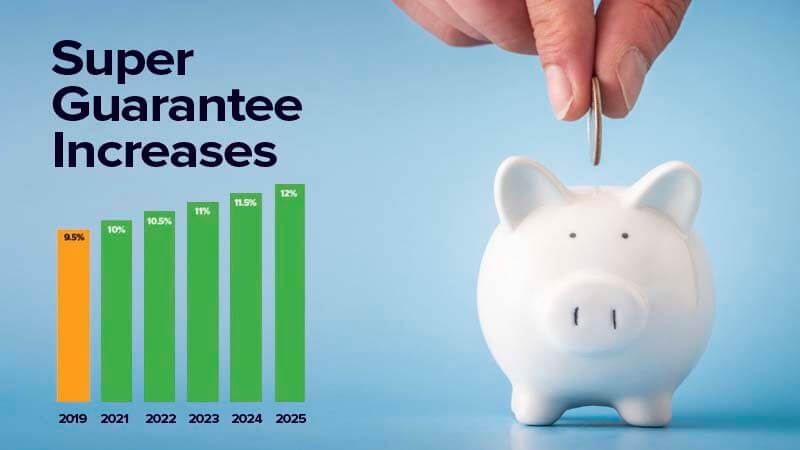With another quarter’s super obligation coming for the period to the end of September 2025, it is timely to remind clients of the changes to Super.
On 1 July 2025, the superannuation guarantee rate increased to 12%, marking the final stage of a series of previously legislated increases.
Employers currently need to make superannuation guarantee (SG) contributions for their employees by 28 days after the end of each quarter. That is:

- Quarter 1 – 1 July to 30 September is due to be received by the employee’s fund by 28 October
- Quarter 2 – 1 October to 31 December is due to be received by the employee’s fund by 28 January
- Quarter 3 – 1 January to 31 March is due to be received by the employee’s fund by 28 April and
- Quarter 4 – 1 April to 30 June is due to be received by the employee’s fund by 28 July.
There is an extra day’s allowance when these dates fall on a public holiday. This does not include weekends, though, so if the due date falls on a weekend, you must take this into account, as you don’t receive the extra day’s allowance.
To comply with these rules, the contribution must be in the employee’s superannuation fund on or before this date, unless the employer is using the ATO small business superannuation clearing house (SBSCH). As we have been advising business clients for some time, we recommend that you arrange to pay your staff super at least 7 days before the due date.
The ATO has been applying considerable compliance resources in this space in recent years, which can have an impact on both employees and employers.
Employers
To be eligible to claim a tax deduction on SG contributions, the quarterly amount must be in the employee’s super account on or before the above quarterly due dates. The only exception to this is where the employer is using the ATO SBSCH. In that case, a contribution is considered made provided the SBSCH has received it on or before the due date.
Employers using commercial clearing houses should be mindful of turnaround times. Commercial clearing houses collect and distribute employee contributions and may be linked to accounting/payroll software or provided by some superannuation platforms. Anecdotally, it seems that turnaround times for some clearing houses could be up to 14 days, so it is recommended that employers allow sufficient time before the quarterly deadlines when processing their employee SG contributions.
If these deadlines are missed (yes, even by a day!), that will trigger a superannuation guarantee charge (SGC) requirement, which will result in a loss of the tax deduction and other penalties.
The SGC requirements are outlined in the ATO link below:
The super guarantee charge | Australian Taxation Office
Employers have the option to make SG payments more frequently than quarterly, and they will need to become accustomed to this if the proposed ‘payday’ superannuation reforms become law. This change is proposed to commence from 1 July 2026 and would require SG to be paid at the same frequency as salary or wages. There is some discussion on the payday super proposal at this link (noting that this is not yet law). The SBSCH will now close. Employers using this service should consider transitioning to a commercial clearing house. Please let us know if you would like assistance with this transition.
We have already been in discussion with several clients to change their frequency to at least monthly, which aligns the PAYG / Instalment Activity Statement requirements, payroll tax and now Super. If you are able to, iron out any issues with paying more frequently now (to monthly), it will start to prepare you for Pay Day Super as set out above.
Employees
It is recommended that you regularly check your superannuation fund statements and reconcile employer contributions to the amounts listed on your pay slips.
Where SG contributions are not received on time (or at all!), employees are encouraged to discuss this first with their employer. Should this not result in a satisfactory conclusion, employees can consider bringing this to the attention of the ATO.
There is some helpful discussion on this process at the following link.
If you have any queries or concerns, please get in touch with our Client Care team, and we will be happy to assist.



